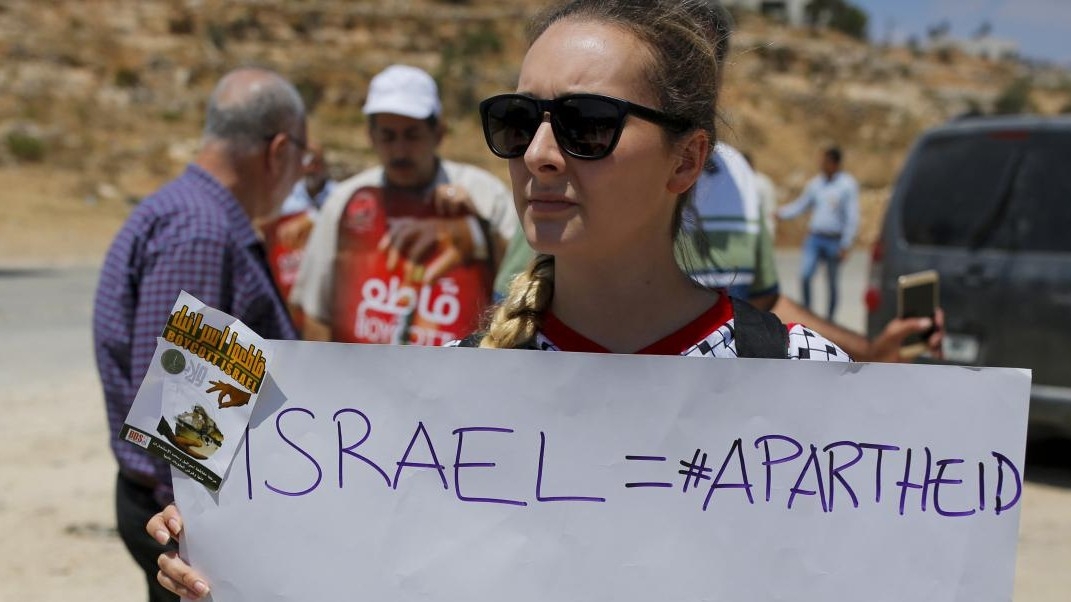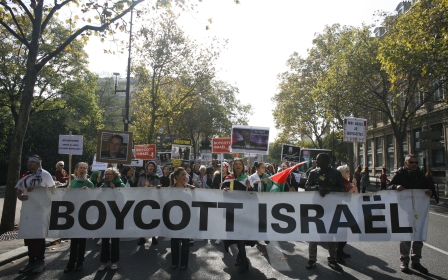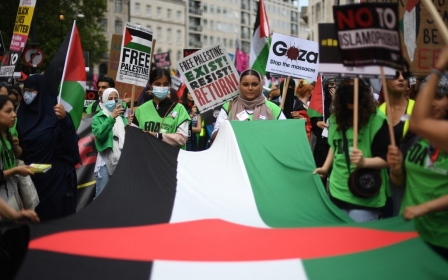Why our boycott of Israeli academic institutions will hurt the apartheid regime

The Middle East Studies Association (Mesa) voted overwhelmingly in late March to pass a resolution supporting the Boycott, Divestment, Sanctions movement (BDS) targeting apartheid Israel.
The resolution passed with 80 percent voting in favour, with 45 percent of the eligible membership participating in the referendum. This is a tremendous victory, one I am proud of as a Mesa member, for the past 19 years.
More active solidarity is necessary in the face of a farcical US-brokered peace process that has enabled Israel to entrench its apartheid regime
Consisting of nearly 3,000 academics and educators - faculty, students and practitioners from around the world - Mesa is an institution committed to knowledge production and first-rate scholarship about the Middle East and North Africa (Mena).
The members of this association, now more than half a century old, have harnessed years of rigorous scholarship and intellectual output to conclude that solidarity with Palestinians must today deepen and expand.
More active solidarity is necessary in the face of a farcical US-brokered peace process that has enabled Israel to entrench its apartheid regime, and is consistent with the association’s ethical commitments, as the BDS call has come from Palestinians themselves.
Mesa’s vote further affirms its commitment to academic freedom. Its Committee on Academic Freedom (CAF) has issued no fewer than 98 letters protesting against Israel’s infringement of Palestinian academic freedom.
Most recently, Caf authored a letter in protest at Israel’s new policy that “vests the Israeli military with the unilateral power to select and exclude international faculty, academic researchers, and students who wish to teach, study, and conduct research at Palestinian universities”, thus bringing Palestinian institutions of higher education under the direct purview of the Israeli military.
No risk to Israeli academic freedom
This is to say nothing of Israel’s outright attacks on Palestinian universities, students and faculty. Israeli forces have repeatedly targeted and bombed Palestinian schools during military assaults on Gaza and other Palestinian cities and lands.
The Israeli military has systematically raided Palestinian universities under the pretence of countering “terrorist activities”, in the process arresting and detaining Palestinian students. One recent raid took place in January this year, at Birzeit University, where Israeli forces shot one student and arrested four others.
Beyond physical attacks, Israel has prevented scholars from travelling to academic conferences, prevented students from reaching their universities through road closures and curfews, and has expelled students in their final year of study due to mobility restrictions.
Amid these structural conditions, academic freedom is impossible. To insist otherwise exposes a troubling hypocrisy to which Palestinians have been long subject.
Insisting on the right to academic freedom for Palestinians should not and ultimately does not pose a risk to Israeli academic freedom - and neither does Mesa’s successful resolution. Because this resolution does not call for the boycott of individual Israeli scholars, but rather Israeli academic institutions.
Israeli academic institutions are central to the military and racist violence against Palestinians. The L Greenberg National Institute of Forensic Medicine at Tel Aviv University still holds the corpses of several Palestinian hostages. Haifa University’s national security studies programme engineered the racist framework of the “Arab demographic threat” and helped shape the route of the annexation wall, deemed illegal by the International Court of Justice in 2004.
And all Israeli universities beyond the tenuous green lines are inaccessible to Palestinian students in the Occupied Territories because of movement restrictions.
Academic freedom for all
Mesa BDS resolution does not bind individual scholars who are Mesa members to take specific actions that do not align with their political beliefs. Individual members of the association are free to participate or not, based on their personal preferences.
For Mesa members who choose to adhere to the resolution, it would include, for example, not accepting funding, promotion or cooperation with an Israeli academic institution; not attending conferences at Israeli academic institutions or those sponsored by them; and not publishing with Israeli academic presses.
That Mesa’s BDS resolution does not ultimately bind individual members to take up such practices shows the extent of its organisational commitment to academic freedom for all.
The membership, through its resolution, has directed the association’s board of directors to offer further guidance on how to give spirit to the intent of the resolution. This guidance will be critical to ensure that all members continue to feel welcomed inside the association as it expands its solidarity with Palestinian students and educators through BDS.
Important victory
Following the announcement of the successful passing of Mesa's BDS resolution, its opponents began sending a deluge of emails to the directors of Middle East studies programmes and centres across the United States. The emails demanded these directors protest the resolution by annulling their institutional memberships with Mesa.
These opponents of BDS, who rather ironically refuse to respect the democratic will of Mesa's membership, subsequently claimed their incessant email campaign succeeded in six centres committing to withdraw their Mesa memberships.
The top-down campaign seeking to harass and to punish is typical of past patterns
But the claim was erroneous. Only one centre has been confirmed as having actually withdrawn, and several of the listed centres either explained that the information was false or that their membership had simply and inadvertently lapsed.
The top-down campaign seeking to harass and punish is typical of past patterns. The thoughtful and firm non-response to these efforts, and the reaffirmation and commitment to Mesa and its membership, signal a significant change within Middle East studies.
BDS is a solidarity movement that encourages allies to, at the very least, do no harm. It is a campaign that the leading association for the study of the Mena region is now firmly behind.
This victory is an important one - indeed, a historic one. May it contribute to the liberation of Palestinians everywhere.
The views expressed in this article belong to the author and do not necessarily reflect the editorial policy of Middle East Eye.
Middle East Eye propose une couverture et une analyse indépendantes et incomparables du Moyen-Orient, de l’Afrique du Nord et d’autres régions du monde. Pour en savoir plus sur la reprise de ce contenu et les frais qui s’appliquent, veuillez remplir ce formulaire [en anglais]. Pour en savoir plus sur MEE, cliquez ici [en anglais].





